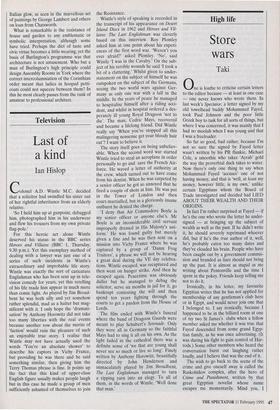Television
Last of a kind
Ian Hislop
Colonel A.D. Wintle M.C. decided that a solicitor had swindled his sister out of her rightful inheritance from an elderly relative.
`So I held him up at gunpoint, debagged him, photographed him in his underwear and flew his trousers from my own private flag-pole.'
For this heroic act alone Wintle deserved his status in the BBC series Heroes and Villains (BBC 1, Thursday, 9.30 p.m.). Yet this exemplary method of dealing with a lawyer was just one of a series of such incidents in Wintle's extraordinary and improbable life story. Wintle was exactly the sort of caricature Englishman who has been sent up in tele- vision comedy for years, yet this retelling of his life made him appear in much more than comic light. As played by Jim Broad- bent he was both silly and yet somehow rather splendid, mad as a hatter but mag- nificent with it. I only hope the 'dramati- sation' by Anthony Horowitz did not take too many liberties with the real events because another row about the merits of `faction' would ruin the pleasure of such an enjoyable true story. I realise that Wintle may not have actually used the words 'You're an absolute shower' to describe his captors in Vichy France, but providing he was there and he said something similar, then giving him the Terry Thomas phrase is fine. It points up the fact that this kind of upper-class English figure usually makes people laugh but in this case he made a group of men sufficiently ashamed of themselves to join the Resistance.
Wintle's style of speaking is recorded in the transcript of his appearance on Desert Island Discs in 1962 and Heroes and Vil- lains: The Last Englishman was cleverly based on this interview. Roy Plomley asked him at one point about his experi- ences of the first word war. 'Weren't you ever afraid?' asked Plomley. 'No', said Wintle 'I was in the Cavalry.' On the sub- ject of his terrible wounds he said 'I took a bit of a clattering.' Whilst given to under- statement on the subject of himself he was outspoken on the subject of the Germans, seeing the two world wars against Ger- many as only one war with a lull in the middle. In the years of peace he managed to hospitalise himself after a riding acci- dent, and whilst in hospital ordered a des- perately ill young Royal Dragoon 'not to die'. The man, Cedric Mays, recovered and became a lifelong friend. Did Wintle really say 'When you've stopped all this malingering nonsense get your bloody hair cut'? I want to believe it.
The story itself goes on being unbeliev- able. When the second word war started Wintle tried to steal an aeroplane in order personally to go and save the French Air- force. He waved a letter of authority at the crew, which turned out to have come from his dentist. When he was carpeted by a senior officer he got so annoyed that he fired a couple of shots at him. He was put in the Tower of London and then court-martialled, but in a gloriously insane outburst he denied the charge.
`I deny that Air Commodore Boyle is my senior officer or anyone. else's. Mr Boyle is an inconsiderable civil servant improperly dressed in His Majesty's uni- form.' He was found guilty but merely given a fine and he was then sent on a mission into Vichy France where he was captured by a group of 'Damn Frog Traitors', a phrase we will not be hearing a great deal during the VE day celebra- tions. Wintle escaped, was recaptured and then went on hunger strike. And then he escaped again. Peacetime was obviously duller but he managed to debag the solicitor, serve six months in jail for it, go bankrupt contesting the will and then spend ten years fighting through the courts to get a pardon from the House of Lords.
The film ended with Wintle's funeral where the band of Dragoon Guards were meant to play Schubert's Serenade. Only they were all in Germany so the faithful Mays had to sing it all on his own. As the light faded in the cathedral there was a definite sense of 'we that are young shall never see so much or live so long'. Finely written by Anthony Horowitz, beautifully directed by John Henderson and immaculately played by Jim Broadbent, The Last Englishman managed to turn a ripping yarn into an elegy. To all of them, in the words of Wintle, 'Well done that man.'


























































 Previous page
Previous page